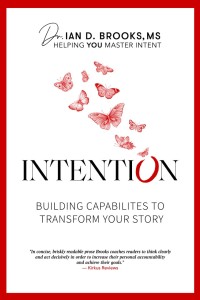Have you ever wanted to better yourself or overcome a problem but didn’t know where to start? Do you find that you have an ingrained way of approaching life that derails your ability to move forward? Or have you taken steps to move forward only to realize you are right back where you started? Dr. Ian D. Brooks, MS Prioritize who you are in understanding your story’s characters, it’s set, and script that influence you Explore beyond your immediate reasons for change to reflect your wants Take manageable action for something new, while adjusting old habits Build capabilities to manage changes for in an unknown future If you’re ready to… …then your journey of transformation begins with Intention. Dr. Ian D. Brooks, MS — affectionately known as Dr. B — will help you manage your intent.
:
:
Extract
YOU
“Don’t judge the book based on the chapter you walked in on.”
— Anonymous
YOU HAVE AN INGRAINED WAY of approaching life and habitual actions that you rely upon. The reliance on these actions is heightened during periods of change or unexpected events. You may even find those actions don’t work in certain situations, or they only serve to keep you where you are – which can go against the story you’re hoping to evolve through in order to transform.
Confronting truths about your story and the effects on your transformation is where most people are not living up to their ability. Instead they’re remaining with their defiant selves, sticking to what’s comfortable, and failing to see themselves for who they are.
This internal focus on you is one of several layers offering complexity based on some truth, blind spots, and self-deception for survival. Author Abe Arkoff, in his book The Illuminated Life, noted that self-deception is useful when it’s: (a) temporary, (b) reserved for overwhelming situations, and (c) maximizes our positives and minimizes our negatives. Further, self-deception is either intentional or unintentional.
Intentional deception can result from information you consciously withhold or situations that you purposefully misrepresent. Unintentional deceptions involve information you feel is unimportant as part of your story, or may come from your blind spots which haven’t been recognized as part of impeding your growth.
Self-deception offers a haven to continue your narrative without fear of showing too much about yourself (decisions or behaviors) you wish to avoid.
This part of the book will help you focus on the “Principle of You.” It is centered on clarifying the current story that shapes you from the history of you – your characters, environment, and choices – and how this impacts your transformation.
THE PRINCIPLE OF YOU
When viewing one grain of sand with the naked eye, the grain looks very small, even when placed at the tip of a baby’s finger. Yet, when that a grain of sand is placed under a microscope, it looks like a boulder.
Still, it’s only a grain of sand.
Many grains of sand together create a different picture, like a beach or desert. The picture can be seen as positive – on a beach, in the sun, maybe drinking a cold beverage by the water. The collective image can also be seen as negative – in the middle of nowhere, in the desert with no water, and facing extreme heat.
But you wouldn’t know all that without looking at the broader context of that grain of sand. When combined with others, that grain is a part of something. Not to be lost, is that the grain of sand is still a truth unto itself. Unique. Complex. Detailed. Regardless of the surrounding sand. Regardless of its size.
Similar to the grain of sand, your story is more complex than what you want to transform. Your story is built on a foundation of your characters, your environment, and what you are willing to do.
Your actions served a purpose at one time. However, similar to any means of survival, they may have outlived their usefulness and may need to be retired. Further, there may be historical actions, times where you’ve cut corners simply to reduce discomfort or “get through it,” but didn’t truly solve the issue.
When uncovering a deeper truth, you are intentionally opening yourself to the vulnerability that comes from recognizing previous decisions, feelings, and actions. This may cause more emotional angst, but it is necessary for your progress.
This is similar to starting the remodeling of a house and finding piping that must be redone according to code. What started as a small project is now one which requires far more effort and stress. This doesn’t make us weaker, any more than the deficient piping makes a house less stable. It does mean that there will be more work than initially expected in order to effectively transform.
Similar to grains of sand, your challenge is to explore those themes (or grains) within your story (characters, environment, and choices) that may influence your transformation.
Thank you, Dr. Ian Brooks and Coriolis Company
:
About the author
Dr. Ian Brooks is the chief executive and founder of Rhodes Smith Consulting leading transformations of people and organizations for over 24 years. Ian has extensive experience in executive and leadership development, change management, business performance consulting, and communication planning. Ian holds a PhD in Industrial /Organizational Psychology from Marshall Goldsmith School of Management at Alliant International University, a Master’s in Clinical Psychology from Auburn University at Montgomery, and a Bachelor’s in Psychology from Morehouse College.
:
Author Links
Website: http://rhodessmith.com/meet-ian
Twitter: https://twitter.com/drb_intention
IG: https://www.instagram.com/drb_intention
:
:
Book Link
Amazon: https://www.amazon.com/Intention-Building-Capabilities-Transform-Story/dp/1735975001/
:


